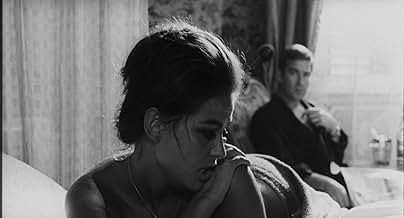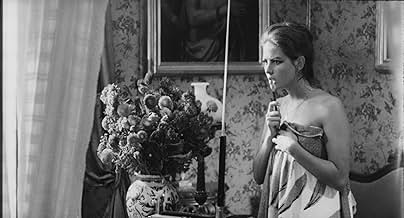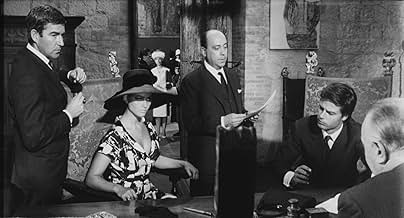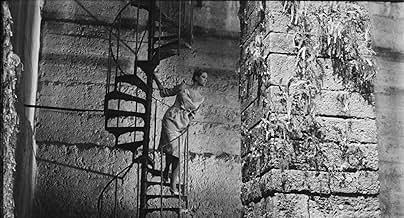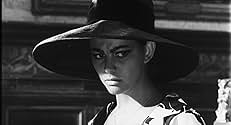Adicionar um enredo no seu idiomaSandra returns to her childhood village to take care of family business, but her childhood memories and secrets soon overcome her.Sandra returns to her childhood village to take care of family business, but her childhood memories and secrets soon overcome her.Sandra returns to her childhood village to take care of family business, but her childhood memories and secrets soon overcome her.
- Direção
- Roteiristas
- Artistas
- Prêmios
- 3 vitórias e 2 indicações no total
- Party Guest
- (não creditado)
- Party Guest
- (não creditado)
Avaliações em destaque
Incest is a leading theme in Sandra; we are given clues about it throughout the film, but not a definite proof. The affair of the siblings remains in the shadows and there's something odd in the relationships between the children and the parents. Visconti first approaches this controversial theme calmly, showing it as a small thing - we are not told much about it. But then he increases it to enormous dimensions.
Luchino Visconti sets this story to a dying city around a aristocratic class that is dying out. Great tragedies, misfortunes and decay lead this class to extinction. Already in Senso Visconti achieved an aesthetic revolution, but he continues this in Sandra with a political and ethic revolution. Sandra is not the easiest film by Visconti and many people in the theater seemed to neglect it. In the beginning I found it a little unreachable and absurd but it grew up to be a beautiful allegorical description of the decay of an aristocratic family.
Here, Andrew (the outsider) is an interesting character. Innocently, (without receiving an oracle!), he analyzes 'the curse' of the dead father rationally, objectively and very ordinarily in vain and opens Pandora's box with his 'good' foolhardiness. Besides, he judges Gianni according to 'his' ethics as a total stranger and raises his fist against his brother-in-law. And still he is never involved in the mythology and should walk away forever. Is he an incarnation of our prosaic civilization of today? The establishment that he is an American (who has a camera!) could be an irony in Visconti's own way?
By the way, recently I watched Desperate Housewives, season 2, Episode 9, "That's Good, That's Bad", and suddenly I remembered the scene in which Gianni takes out the pills and threatens Sandra : George who took the pills menaces Bree ... (so I'm writing this comment now, but I know it's an exaggerated analogy, anyway....)
Jean Sorel is heavenly beautiful. The scene in the water tower takes my breath away. César Franck's music suits the aestheticism of the director, too.
If you are an amateur of Visconti's works, you might know this one doesn't end just as in the original script. Do you think Sandra flies across the ocean to join Andrew or she buries herself in her destined blood there eternally?
Including Mourning Becomes Electra, it could be interesting to refer to also : 1. Les Enfants terribles / Jean-Pierre Melville (1950) 2. Höhenfeuer /Fredi M. Murer (1985) 3. Jeux d'artifices / Virginie Thévenet (1987) 4. La Banyera / Jesús Garay (1989 / fantastic!)
The unknown "Vaghe Stelle dell'Orsa..." is another great movie of this artist called Luchino Visconti. The plot about incestuous relationship and family issues in the hands of another director could have become a melodramatic soap-opera. But Visconti explores the sensuality and beauty of Claudia Cardinale to deliver an intriguing and quite erotic family drama without any redemption. The set decoration, as usual, is another piece of art, supported by a classy music score. My vote is eight.
Title (Brazil): Not Available
Now, "Sandra Of A Thousand Delights" is still a point in Visconti's career where he's developing as a director. He's close but he's not quite there. Shot in black and white, and with an overly dark photography that emphasizes the desolate feel, even though this is a highly intense drama - perhaps too dramatic for it's own good, it doesn't have the necessary substance to back up the plot. In the end it's just a family drama and nothing more, even if it's a forceful one: Sandra reunites with her family on the eve of her father's memorial service but there's two dark secrets lurking in the shadows; her incestuous affair with her brother, and her adulterous mother's dereliction of her husband (Sandra's father) in a concentration camp.
Você sabia?
- CuriosidadesOne of the first films in which Claudia Cardinale, who was born in Tunisia and whose first language was French, dubbed herself in Italian.
- Citações
Gianni Wald-Luzzati: Why can't you be honest for once? Did God tell you to become a nun? Did he tell you to get married and that would satisfy you? Did he tell you that nun's are sick with desire and frustration? That they're willing to mortify their flesh? Now, why must you torment yourself? Why should you fill so full of guilt? So wretched and alone?
- Trilhas sonorasPrelude, chorale and fugue
Written by César Franck
Principais escolhas
- How long is Sandra?Fornecido pela Alexa
Detalhes
- Data de lançamento
- Países de origem
- Central de atendimento oficial
- Idiomas
- Também conhecido como
- Sandra
- Locações de filme
- Geneva, Canton de Genève, Suíça(opening sequence: party at Sandra and Andrew's apartment)
- Empresas de produção
- Consulte mais créditos da empresa na IMDbPro
Bilheteria
- Faturamento bruto mundial
- US$ 927
- Tempo de duração1 hora 45 minutos
- Cor
- Mixagem de som
- Proporção
- 1.66 : 1
Contribua para esta página


